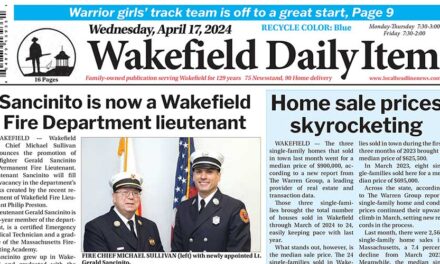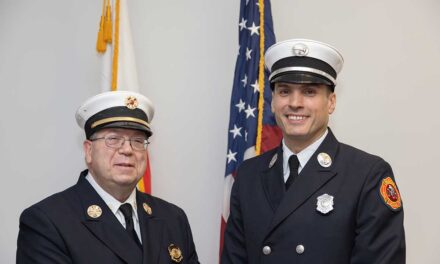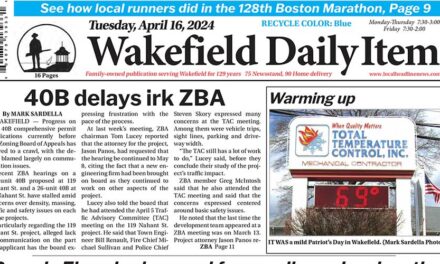By GAIL LOWE
WAKEFIELD — Over the next two weeks, the school board’s Policy Subcommittee, chaired by Gregory Liakos, will meet to continue discussions about guidelines as they apply to the various booster clubs at the high school.
Booster club members will be invited to the meeting to provide their input and the guidelines will be adjusted, if needed. The current or revised guidelines then will be presented for a vote at the school board’s meeting on Tuesday, Feb. 11.
The guidelines, written by Superintendent of Schools Dr. Stephen K. Zrike with input from Director of Health, Wellness and Athletics Michael Boyages; Director of Visual and Performing Arts Thomas Bankert; high school Principal Richard Metropolis; Business Administrator Michael Pfifferling and Town Counsel Thomas Mullen, are in conjunction with a policy concerning relations with booster organizations, which also was expected to be voted on last night. But because some members were uneasy with the guidelines as presented, the vote was tabled.
The decision to delay came about after Paul Buckley, 34 Keeling Rd., representing the Warrior Club, and other parents stepped up to the microphone to share their concerns about the guidelines.
“We have problems with the process and content and would like to delay the vote until we give our input,” said Buckley, adding that it was his and other booster members’ assumption that there would be additional meetings to discuss the guidelines.
School board Chairman Christopher Callanan, however, commented that the guidelines had been on the table for a few weeks and urged that members either endorse the guidelines (or not) at last night’s meeting.
“We want this in place as soon as possible,” he said, adding that guidelines had not been in place this past fall or over the past few winter months.
Zrike commented that “each day this goes by it becomes a more serious concern.”
Liakos agreed with Callanan and said he thought the guidelines should be in place before the next meeting. He also said that one of the most important guidelines concerns compensation for hiring additional staff, i.e., coaching assistants, as outlined later in this article.
School board member Thomas Markham commented that the guidelines should rise to the level of the policy.
“The guidelines can be easily changed but it’s not as easy to change a policy,” he said.
Markham then pointed out that booster organization business should be between the school board and the booster community, not the school board and superintendent.
“This is the first time I’ve ever seen Tom Mullen involved,” he said. “The School Committee needs to own it.”
In a memorandum to the boosters clubs, Zrike wrote that at a meeting on Oct. 27 there was “healthy discussion about the appropriate balance of district oversight and Booster autonomy to support specific programming.”
Zrike continued: “It is not our interest to be prescriptive or to micro-manage your organization. Rather, we are committed to maintain clear and consistent practices across the district that adhere to state, federal and local policies and practices. To this end, we have created a series of operating guidelines that can define our work moving forward.”
Liakos emphasized that discussions had been held and that he thought the delineation between the boosters and school district were in line with the way school administrators interact with PTOs.
“The School Committee empowers the Superintendent to carry out the guidelines,” he said.
Key points of the guidelines are as follows:
• Compensation for hiring additional staff, i.e., coaching assistants: It is the district’s responsibility to supervise school sponsored programs and activities such as hiring, evaluating and terminating athletic and activities personnel and hire and supervise officials and judges. If a Booster organization wishes to pay for additional and/or extra-curricular services, these individuals must be hired in compliance with the policies and procedures of the district. The Booster organization should donate funds to the district for the proposed expenses prior to the district making any commitment to hire and individual. The funds must be sufficient to pay for the actual services plus any benefits for the employee. This practice would be in effect for the spring 2015 athletic season.
• Serving and selling food procedures: Booster organizations are encouraged to review and become knowledgeable about applicable laws, including state and local food handling requirements and state and federal nutritional standards. It is also important that all Booster organizations adhere to the district’s policies and practices regarding serving food outside of school hours on school grounds.
• Use of facilities: Organizations should fill out a request for the use of a facility, including kitchens, if they are interested in using a school building for an event. Booster organizations are not charged for facility use as a non-profit, but depending on the size of the event, may be required to hire a custodian, a food service employee and/or police/fire detail.
• Donations: Gifts, including items or money, donated to a school, athletic or music program by a corporation, organization or individual(s) should be accepted by the School Committee and become the property of the public schools in Wakefield. The organization making the donation may indicate what program the gift is intended to benefit and the School Department will make every effort to accommodate the request. The district, however, has the right to repurpose, relocate or discard (damaged or end of useful life) the donation.
• Communication: If there are questions or concerns regarding programs, Booster organizations should contact the Director of Health, Wellness and Athletics and the Director of Visual and Performing Arts. Budget, fundraising, purchases and banquet activities should receive advance guidance and approval from these directors. If an issue persists, the organization should contact the school principal first and ultimately the superintendent’s office.
• Fundraising: All organizations should ensure transparency when fundraising. Information should be posted that specifies the name of the Booster organization sponsoring the fundraiser. Contributors should be clear about where proceeds will go before making a contribution. Students should not engage in canning at fundraisers.
• 50/50 Raffles: Massachusetts law governs when and how eligible organizations can conduct raffles, which require the payment of a fee for a chance to win a prize. Raffles include 50/50 raffles and donation drawings. Public schools are not eligible organizations but booster organizations with 501(c)(3) status may be.
A motion to delay the vote on the policy until the next school board meeting also passed. The policy reads as follows:
“The Wakefield Public Schools recognizes the positive contributions that Booster organizations make to our students. We appreciate the time, energy and resources that Booster organizations dedicate to our schools on behalf of the students.
“In an effort to promote a successful partnership and relationship between Booster organizations and the public schools, the Superintendent should establish operational guidance to all Booster organizations on an annual basis.”




